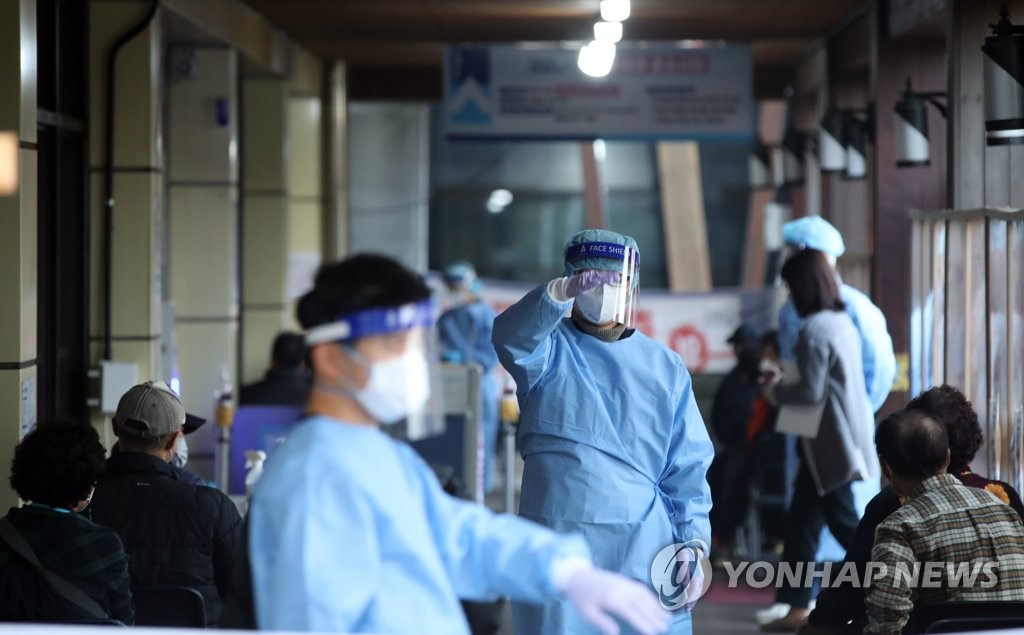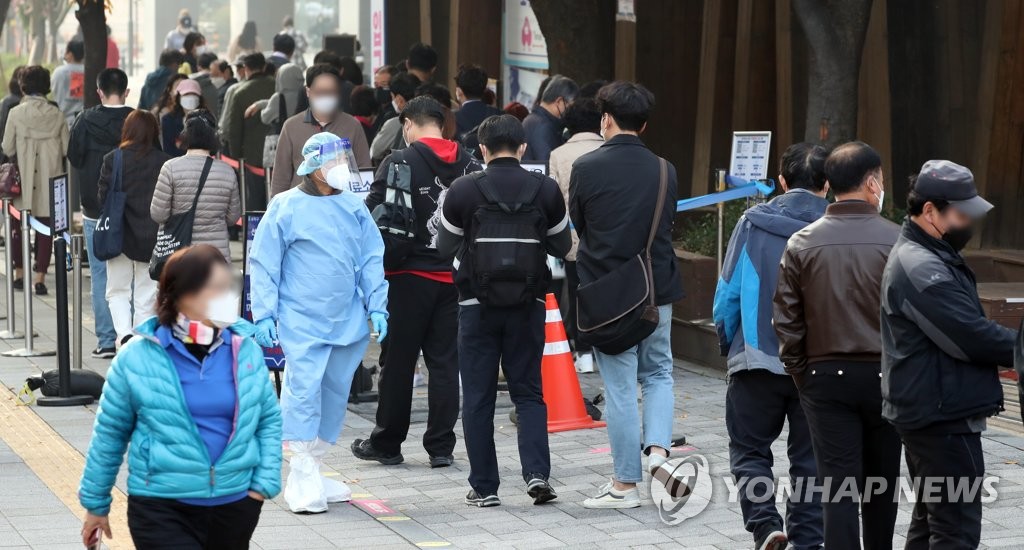- California Assembly OKs highest minimum wage in nation
- S. Korea unveils first graphic cigarette warnings
- US joins with South Korea, Japan in bid to deter North Korea
- LPGA golfer Chun In-gee finally back in action
- S. Korea won’t be top seed in final World Cup qualification round
- US men’s soccer misses 2nd straight Olympics
- US back on track in qualifying with 4-0 win over Guatemala
- High-intensity workout injuries spawn cottage industry
- CDC expands range of Zika mosquitoes into parts of Northeast
- Who knew? ‘The Walking Dead’ is helping families connect
New virus cases soar to nearly 2,000 ahead of start of phased return to normalcy
South Korea’s new coronavirus cases soared to nearly 2,000 on Wednesday, as fresh concerns emerge over people letting their guard down ahead of the start of a gradual easing of virus curbs aimed at returning to normalcy.
The country added 1,952 more COVID-19 cases, including 1,930 local infections, raising the total caseload to 356,305, according to the Korea Disease Control and Prevention Agency (KDCA).
The latest count is a big jump from the previous day’s 1,266 and 1,190 reported on Monday, although the daily caseload remained below 2,000 for the 19th straight day.
The daily infection tally has stayed in the quadruple digits since July 7, including the record high of 3,272 cases on Sept. 25.
The country added nine more deaths, raising the death toll to 2,797. The fatality rate stood at 0.79 percent.
As of 9 p.m. Wednesday, health authorities and local governments had reported 1,928 new COVID-19 cases, up 73 from the same time Tuesday.
Daily cases are counted until midnight and announced the following morning.
Wednesday’s hike in the daily cases came amid growing concerns that people might be lowering their guard too soon with the planned shift to the “living with COVID-19″ scheme on Nov. 1.


Medical workers guide visitors at a COVID-19 testing station in Seoul’s eastern district of Songpa on Oct. 27, 2021. (Yonhap)
Health authorities said the recent relaxation of some COVID-19 rules, which came as an interim step before implementing the new scheme, may have caused the caseload to rise.
Since Oct. 18, people have been allowed to gather in groups of up to eight in the greater Seoul area, and up to 10 in non-metropolitan regions. Business hours for some multiuse facilities, like study rooms and movie theaters, have been extended to midnight.
“As expectations over the return to normal daily life grow, we have seen an increase in movement and activities,” Sohn Young-rae, a senior health official said in a briefing.
“Also there is the ventilation issue associated with the fact that these activities are taking place more indoors than the outside due to the weather change,” Sohn said.
Sohn warned of yet another potential spike in infections as many Halloween celebrations are expected over the rest of this week, especially among the expat communities.
“We will check the popular hangouts frequented by young people,” he said.
Under the upcoming new scheme, the virus restrictions will be lifted in phases through the end of January next year, starting off with allowing cafes, restaurants and other multiuse facilities to operate 24 hours and private gatherings of up to 10 people, regardless of vaccination.
But basic preventive measures will stay in effect, like wearing masks indoors.
The government will also introduce the “vaccine pass” system next month, which requires a vaccination certificate or a negative test result for entry into multiuse and high-risk facilities.
About 40.89 million people, or 79.6 percent of the country’s 52 million population, had received their first COVID-19 vaccine shots as of Tuesday. The number of fully vaccinated people came to 36.71 million, or 71.5 percent.
Health officials said 19,954, or 0.074 percent of 26.93 million people vaccinated in South Korea are estimated to have been infected as “breakthrough” cases, many of whom were in their 30s, officials said.
The cumulative tally on virus variants came to 46,417 cases, with the delta variant accounting for all but one.
Of the locally transmitted cases reported Wednesday, Seoul had 729 cases, with the surrounding Gyeonggi Province logging 740 cases and Incheon, west of Seoul, 125 cases.
Twenty-two cases came from overseas, putting the cumulative total at 15,025.
The total number of people released from quarantine after making full recoveries came to 329,658, up by 2,066 from a day earlier, the KDCA said.











